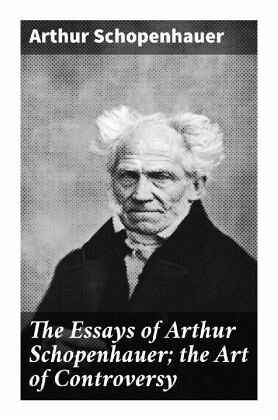
The Essays of Arthur Schopenhauer; the Art of Controversy
Versandkostenfrei!
Versandfertig in 6-10 Tagen
7,99 €
inkl. MwSt.
Weitere Ausgaben:

PAYBACK Punkte
4 °P sammeln!
In "The Essays of Arthur Schopenhauer; the Art of Controversy," the renowned philosopher delves into the intricacies of argumentative practice, articulating a rigorous and critical approach to discourse. Written in Schopenhauer's distinctly provocative style, the essays combine wit with philosophical depth, emphasizing the importance of rhetorical skill and the psychological dimensions of debate. He challenges conventional notions of truth and persuasion, presenting a comprehensive analysis of logical fallacies and the art of dialectic, which remains remarkably relevant in contemporary discuss...
In "The Essays of Arthur Schopenhauer; the Art of Controversy," the renowned philosopher delves into the intricacies of argumentative practice, articulating a rigorous and critical approach to discourse. Written in Schopenhauer's distinctly provocative style, the essays combine wit with philosophical depth, emphasizing the importance of rhetorical skill and the psychological dimensions of debate. He challenges conventional notions of truth and persuasion, presenting a comprehensive analysis of logical fallacies and the art of dialectic, which remains remarkably relevant in contemporary discussions surrounding ethics and dialogue. Arthur Schopenhauer, a pivotal figure of 19th-century philosophy, is best known for his profound insights into pessimism and the human condition. His exposure to various philosophical traditions, particularly German idealism and Eastern thought, shaped his skeptical views toward prevailing societal norms. The background of Schopenhauer's life-marked by personal struggle and a penchant for solitude-infused his essays with an acute awareness of the human foibles that underlie effective and ineffective discourse. This work is essential for anyone interested in philosophy, rhetoric, or effective communication. Schopenhauer's acute observations not only enhance readers' understanding of argumentative strategies but also encourage critical self-reflection, making "The Art of Controversy" a robust tool for intellectual engagement and personal growth.













